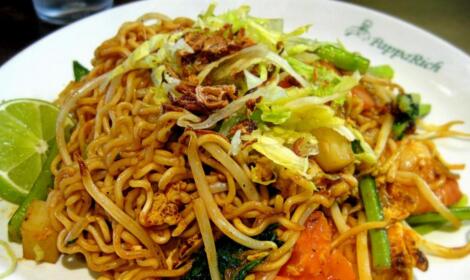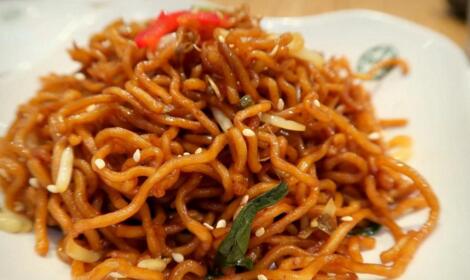用餐礼仪:为什么有些亚洲人会抢着付账?
正文翻译

Fighting over paying the bill for meals is something some of us are guilty of. If we’re the stereotypical Asian eating with other stereotypical Asians, coming out on tops to pay for a meal is often a big battle, sort of a sport in itself.
为付饭钱而争吵是我们中的一些人会感到尴尬的事情。但如果我们是典型的亚洲人,和其他典型的亚洲人一起吃饭,那么谁先出来付饭钱往往会是一场大战,它本身就是一种运动。
This is the case with my Chinese family. When I was a kid living in Malaysia, we had countless family gatherings with extended relatives. We’d have dinner at air-conditioned Chinese restaurants where waiters gave us clean plates after each serving. These nights always ended with lots of yelling, relatives arguing at the top of their lungs as to who would pay for the ten-course meals in cash.
这就是我的中国家人的情况。当我还是个孩子住在马来西亚的时候,我们举办过无数次的大家庭聚会。我们会在有空调的中餐馆吃饭,服务员每次上菜后都会给我们干净的盘子。这些夜晚总是以大喊大叫结束,亲戚们扯着嗓子争论谁该用现金支付十道菜的费用。
In Chinese culture (and other Asian cultures), offering to pay the bill at the end of a meal out is regarded as polite. This goes for family and business-related dining affairs, and no matter the occasion, bill fights are usually amusing.
在中国文化(以及其他亚洲文化)中,外出就餐后主动买单被认为是礼貌的表现。这适用于与家庭和商业有关的用餐事务,无论在什么场合,买单大战通常都很有趣。
Sometimes it’s a pride and face thing that drives the stereotypical Asian to insist on picking up the dining tab. Money is a marker of success along the traditional Chinese train of thought: the more one can afford to spend, the more one can impress. Paying for a meal, the typical Chinese person flaunts their privileged status, coming across as “looking good” and worthy.
有时,出于自尊和面子的考虑,典型的亚洲人会坚持买单。在中国人的传统思维中,钱是成功的标志:一个人花得起的钱越多,就越能给人留下深刻印象。付钱吃饭时,典型的中国人会炫耀自己的财富和地位,给人的印象是“看起来不错”、有深交价值。
This includes my parents. Whilst in Malaysia, once around Christmas my grandparents organised a banquet with a private room at a Chinese restaurant for twenty or so in the family. Naturally as the organisers, they had no qualms footing the bill. As the last dishes of sweet peanut soup and sesame balls were served, my mum walked out the door with a thick envelope. Everyone assumed she was going to the bathroom. When my grandmother went to get the bill, my parents yelled in Cantonese, “Our treat!”
这也包括我的父母。在马来西亚的时候,有一次圣诞节前后,我的祖父母在一家中餐馆的包间组织了一次宴会,大约有20个家庭成员。作为组织者,他们自然会毫不犹豫地买单。当最后一盘甜花生汤和芝麻球上桌时,妈妈拿着一个厚厚的信封走出了门。大家都以为她是去洗手间。但当奶奶去结账时,我的父母用广东话喊道:“我们请客!”
Consequently, some of us of Asian heritage might fight for the bill because we fancy one-upmanship but more importantly, gifting. The opportunity to pay the restaurant bill is a means to leverage connections, a means to remember a relationship.
也就是说,我们亚裔中的一些人可能会抢着买单,因为我们喜欢显示自己的生活条件更好,但更重要的原因是,我们想向我们想交往的人表达自己的热情。买单是一种利用关系的手段,更是一种加深关系的手段。
Historically in Chinese culture, gift giving is an act that allows one to show enthusiasm towards maintaining ties. During the Tang Dynasty, scholars who visited emperors offered the latter rare treasures as a sign of friendship. Confucian thought encourages giving with compassion, encourages individuals to seek out opportunities to give as a mark of respect to heaven and earth. There have been times when my parents organised family dinners and when it came time to get the bill, my relatives laughed in their faces, saying it had been paid. A case of I scratch your back, you scratch mine in terms of spontaneously gifting one a meal.
在中国的历史文化中,送礼是一种表达对双方关系的热情的行为。唐朝时,拜访皇帝的学者向皇帝赠送稀世珍宝,以示友好。儒家思想鼓励"恻隐之心,人皆有之",鼓励人们寻找机会向他人赠予财物,以表达对天地的尊敬。曾经有几次,我的父母组织家庭聚餐,到了结账的时候,亲戚们都笑着说他们已经付过了。在主动买单方面,可谓是我帮你,你帮我。
Sometimes the older, baby-boomer Asian generation wrestles to grab the bill because they feel a duty to provide and pay for food, making sure others have enough to eat. In Chinese culture, the hierarchical family structure sees elders and breadwinners receiving the largest degree of reverence, the ones who can afford to support everyone else. Getting the bill then is an act of love and sacrifice; money is often painstakingly earned, and so then is putting food on the table.
有时,年龄较大的婴儿潮一代亚洲人会抢着买单,因为他们觉得有责任支付账单,确保其他人有足够的食物吃。在中国文化中,等级分明的家庭结构使长辈和负责养家糊口的人受到了最大程度的尊重,因为他们有能力养活其他人。因此,买单是一种爱和牺牲的行为;钱往往是辛苦挣来的,吃饭也是如此。
Different people are expected to pick up the dining tab during different occasions. For some birthdays, it’s customary for the birthday person to pay for food, entertainment and cake while the guests bring gifts. When it comes to (heterosexual) dating in Asia, the guy is expected to pay for everything, from the food to fun – which I personally think is nice.
在不同的场合,需要不同的人来买单。在生日宴会上,习惯上是由过生日的人支付食物、娱乐和蛋糕的费用,而客人则会带着礼物。这里不得不说到在亚洲(异性恋)的约会,从食物到娱乐,男方要支付一切费用——我个人认为这很好。
Losing the bill battle isn’t all embarrassment in front of the typical Asian crowd. Post-fight, there tends to be pats on the backs and a mutual agreement that at least everyone tried. Throughout this camaraderic moment, even the winner swallows their pride. As writer Khalil Gibran said on having good faith:
在典型的亚洲人群面前,输掉买单大战并不会尴尬。争吵结束后,双方往往会拍拍后背,相互表示至少每个人都尽力了。在这友爱的时刻,即使是胜利者也会放下他们的自尊。正如作家纪伯伦在谈到诚信时所说:
“Generosity is giving more than you can, and pride is taking less than you need.”
“慷慨是给予你所能给予的更多,自尊是接受比你所需要的更少。”
These days attitudes are changing towards paying the bill among the younger generation Asians, at least in Australia. A survey in 2014 shows 27% of Australians find it acceptable to split the bill when their dining companions have spent more than them. Going Dutch, splitting the bill or paying for the one dish you ordered happens a lot when I eat out with my Asian (and non-Asian) friends here. Perhaps we’re assimilated into Western culture, perhaps we respect each other as equals, or perhaps it’s simply a personal choice based on the expensive life Down Under.
如今,亚洲年轻一代对买单的态度正在发生变化,至少在澳大利亚是这样。2014年的一项调查显示,27%的澳大利亚人认为,当他们的用餐同伴比他们消费得多时,他们可以接受平分账单。当我和我的亚洲(和非亚洲)朋友出去吃饭时,aa制,分摊账单或只为你自己点的一道菜买单的情况经常发生。也许我们被西方文化同化了,也许我们只是平等地尊重彼此,但也许这只是基于澳大利亚生活成本昂贵的个人选择。
Still, the Asian in me fights to pay the bill time and time again. One weekday afternoon last year, in between out of a job and drafting my first book, I met up with vegan blogger Rebecca Rossi from Peace & Love & Veggies for the first time over lunch. Pushing my tray of pasta and cake to the cashier, I took out my wallet. Rebecca smiled warmly and said, “It’s taken care of.” My eyes bulged at her. But, but there was no need for that! I don’t deserve that…. Paying the bill is an act of selflessness, and as Greek philosopher Epictetus said:
尽管如此,我内心的亚洲人灵魂还是一次又一次地为我是否应该主动买单而挣扎。在去年的一个工作日的下午,在起草我的第一本书的休息间隙,我第一次在午餐时遇到了来自和平与爱与蔬菜的素食博主丽贝卡.罗西。我把盛着意大利面和蛋糕的托盘推给收银员,然后拿出钱包准备付账。丽贝卡热情地笑着说:“我已经买完单了。”我瞪大眼睛望着她。但是,但是没有这个必要!我们才刚刚认识....买单是一种无私的行为,正如希腊哲学家爱比克泰德所说:
“Wealth consists not in having great possessions, but in having few wants.”
“财富不在于拥有更多,而在于需求更少。”
How we feel when someone pays for our meals depends on the occasion. It depends on where we are, who we’re with and how we feel about that person. When someone shouts us a meal, we might feel humbled, loved and thankful if we’re comfortable in their company. On the other hand, we could feel creeped out or suspicious if we didn’t enjoy their presence.
当有人为我们买单时,我们的感受取决于在何种场合。这取决于我们在哪里,和谁在一起,以及我们对那个人的感觉。当有人喊我们吃饭时,如果我们在他们的陪伴下感到舒适,我们可能会感到谦卑、被爱和感激。而相反,如果我们不喜欢他们的存在,我们可能会感到害怕或疑神疑鬼。
The other day I caught up with another blogger, Lisa from Lisa Dorenfest over dinner. We picked out our meals at a cosy eatery in the city and headed to the cashier. “Let me get it!” I said. You’ve traveled so far to Australia. “No! You don’t have to!” Lisa exclaimed, rummaging through her sling bag. I pulled out a fifty dollar note from my wallet and waved it in the cashier’s face. His eyes lit up. And so did Lisa’s. Maybe I’m turning into my parents with a bit of fight.
前几天,我在晚餐时遇到了另一位博主,丽莎.多伦费斯特的丽莎。我们在城里一家舒适的餐馆里选好了饭菜,然后走向收银台。“让我来买单!”我说,“毕竟你来到了这么远的澳大利亚。““不!你不必这么做!”丽莎大声说,并在她的吊带包里翻找着。我从钱包里掏出一张50澳元的钞票,在收银员面前挥舞着。他的眼睛亮了起来,丽莎也一样。也许我有点像我的父母了。
Sometimes we pay the bill because we can. Because we want to. And sometimes we simply want others to have a treat, a deserved treat.
有时候我们买单是因为我们有能力,因为我们想这么做。有时我们只是想让别人得到一份应得的奖赏并好好享受。
Do you fight to pay the bill when eating out?
你在外面吃饭的时候会抢着付账吗?

Fighting over paying the bill for meals is something some of us are guilty of. If we’re the stereotypical Asian eating with other stereotypical Asians, coming out on tops to pay for a meal is often a big battle, sort of a sport in itself.
为付饭钱而争吵是我们中的一些人会感到尴尬的事情。但如果我们是典型的亚洲人,和其他典型的亚洲人一起吃饭,那么谁先出来付饭钱往往会是一场大战,它本身就是一种运动。
This is the case with my Chinese family. When I was a kid living in Malaysia, we had countless family gatherings with extended relatives. We’d have dinner at air-conditioned Chinese restaurants where waiters gave us clean plates after each serving. These nights always ended with lots of yelling, relatives arguing at the top of their lungs as to who would pay for the ten-course meals in cash.
这就是我的中国家人的情况。当我还是个孩子住在马来西亚的时候,我们举办过无数次的大家庭聚会。我们会在有空调的中餐馆吃饭,服务员每次上菜后都会给我们干净的盘子。这些夜晚总是以大喊大叫结束,亲戚们扯着嗓子争论谁该用现金支付十道菜的费用。
In Chinese culture (and other Asian cultures), offering to pay the bill at the end of a meal out is regarded as polite. This goes for family and business-related dining affairs, and no matter the occasion, bill fights are usually amusing.
在中国文化(以及其他亚洲文化)中,外出就餐后主动买单被认为是礼貌的表现。这适用于与家庭和商业有关的用餐事务,无论在什么场合,买单大战通常都很有趣。
Sometimes it’s a pride and face thing that drives the stereotypical Asian to insist on picking up the dining tab. Money is a marker of success along the traditional Chinese train of thought: the more one can afford to spend, the more one can impress. Paying for a meal, the typical Chinese person flaunts their privileged status, coming across as “looking good” and worthy.
有时,出于自尊和面子的考虑,典型的亚洲人会坚持买单。在中国人的传统思维中,钱是成功的标志:一个人花得起的钱越多,就越能给人留下深刻印象。付钱吃饭时,典型的中国人会炫耀自己的财富和地位,给人的印象是“看起来不错”、有深交价值。
This includes my parents. Whilst in Malaysia, once around Christmas my grandparents organised a banquet with a private room at a Chinese restaurant for twenty or so in the family. Naturally as the organisers, they had no qualms footing the bill. As the last dishes of sweet peanut soup and sesame balls were served, my mum walked out the door with a thick envelope. Everyone assumed she was going to the bathroom. When my grandmother went to get the bill, my parents yelled in Cantonese, “Our treat!”
这也包括我的父母。在马来西亚的时候,有一次圣诞节前后,我的祖父母在一家中餐馆的包间组织了一次宴会,大约有20个家庭成员。作为组织者,他们自然会毫不犹豫地买单。当最后一盘甜花生汤和芝麻球上桌时,妈妈拿着一个厚厚的信封走出了门。大家都以为她是去洗手间。但当奶奶去结账时,我的父母用广东话喊道:“我们请客!”
Consequently, some of us of Asian heritage might fight for the bill because we fancy one-upmanship but more importantly, gifting. The opportunity to pay the restaurant bill is a means to leverage connections, a means to remember a relationship.
也就是说,我们亚裔中的一些人可能会抢着买单,因为我们喜欢显示自己的生活条件更好,但更重要的原因是,我们想向我们想交往的人表达自己的热情。买单是一种利用关系的手段,更是一种加深关系的手段。
Historically in Chinese culture, gift giving is an act that allows one to show enthusiasm towards maintaining ties. During the Tang Dynasty, scholars who visited emperors offered the latter rare treasures as a sign of friendship. Confucian thought encourages giving with compassion, encourages individuals to seek out opportunities to give as a mark of respect to heaven and earth. There have been times when my parents organised family dinners and when it came time to get the bill, my relatives laughed in their faces, saying it had been paid. A case of I scratch your back, you scratch mine in terms of spontaneously gifting one a meal.
在中国的历史文化中,送礼是一种表达对双方关系的热情的行为。唐朝时,拜访皇帝的学者向皇帝赠送稀世珍宝,以示友好。儒家思想鼓励"恻隐之心,人皆有之",鼓励人们寻找机会向他人赠予财物,以表达对天地的尊敬。曾经有几次,我的父母组织家庭聚餐,到了结账的时候,亲戚们都笑着说他们已经付过了。在主动买单方面,可谓是我帮你,你帮我。
Sometimes the older, baby-boomer Asian generation wrestles to grab the bill because they feel a duty to provide and pay for food, making sure others have enough to eat. In Chinese culture, the hierarchical family structure sees elders and breadwinners receiving the largest degree of reverence, the ones who can afford to support everyone else. Getting the bill then is an act of love and sacrifice; money is often painstakingly earned, and so then is putting food on the table.
有时,年龄较大的婴儿潮一代亚洲人会抢着买单,因为他们觉得有责任支付账单,确保其他人有足够的食物吃。在中国文化中,等级分明的家庭结构使长辈和负责养家糊口的人受到了最大程度的尊重,因为他们有能力养活其他人。因此,买单是一种爱和牺牲的行为;钱往往是辛苦挣来的,吃饭也是如此。
Different people are expected to pick up the dining tab during different occasions. For some birthdays, it’s customary for the birthday person to pay for food, entertainment and cake while the guests bring gifts. When it comes to (heterosexual) dating in Asia, the guy is expected to pay for everything, from the food to fun – which I personally think is nice.
在不同的场合,需要不同的人来买单。在生日宴会上,习惯上是由过生日的人支付食物、娱乐和蛋糕的费用,而客人则会带着礼物。这里不得不说到在亚洲(异性恋)的约会,从食物到娱乐,男方要支付一切费用——我个人认为这很好。
Losing the bill battle isn’t all embarrassment in front of the typical Asian crowd. Post-fight, there tends to be pats on the backs and a mutual agreement that at least everyone tried. Throughout this camaraderic moment, even the winner swallows their pride. As writer Khalil Gibran said on having good faith:
在典型的亚洲人群面前,输掉买单大战并不会尴尬。争吵结束后,双方往往会拍拍后背,相互表示至少每个人都尽力了。在这友爱的时刻,即使是胜利者也会放下他们的自尊。正如作家纪伯伦在谈到诚信时所说:
“Generosity is giving more than you can, and pride is taking less than you need.”
“慷慨是给予你所能给予的更多,自尊是接受比你所需要的更少。”
These days attitudes are changing towards paying the bill among the younger generation Asians, at least in Australia. A survey in 2014 shows 27% of Australians find it acceptable to split the bill when their dining companions have spent more than them. Going Dutch, splitting the bill or paying for the one dish you ordered happens a lot when I eat out with my Asian (and non-Asian) friends here. Perhaps we’re assimilated into Western culture, perhaps we respect each other as equals, or perhaps it’s simply a personal choice based on the expensive life Down Under.
如今,亚洲年轻一代对买单的态度正在发生变化,至少在澳大利亚是这样。2014年的一项调查显示,27%的澳大利亚人认为,当他们的用餐同伴比他们消费得多时,他们可以接受平分账单。当我和我的亚洲(和非亚洲)朋友出去吃饭时,aa制,分摊账单或只为你自己点的一道菜买单的情况经常发生。也许我们被西方文化同化了,也许我们只是平等地尊重彼此,但也许这只是基于澳大利亚生活成本昂贵的个人选择。
Still, the Asian in me fights to pay the bill time and time again. One weekday afternoon last year, in between out of a job and drafting my first book, I met up with vegan blogger Rebecca Rossi from Peace & Love & Veggies for the first time over lunch. Pushing my tray of pasta and cake to the cashier, I took out my wallet. Rebecca smiled warmly and said, “It’s taken care of.” My eyes bulged at her. But, but there was no need for that! I don’t deserve that…. Paying the bill is an act of selflessness, and as Greek philosopher Epictetus said:
尽管如此,我内心的亚洲人灵魂还是一次又一次地为我是否应该主动买单而挣扎。在去年的一个工作日的下午,在起草我的第一本书的休息间隙,我第一次在午餐时遇到了来自和平与爱与蔬菜的素食博主丽贝卡.罗西。我把盛着意大利面和蛋糕的托盘推给收银员,然后拿出钱包准备付账。丽贝卡热情地笑着说:“我已经买完单了。”我瞪大眼睛望着她。但是,但是没有这个必要!我们才刚刚认识....买单是一种无私的行为,正如希腊哲学家爱比克泰德所说:
“Wealth consists not in having great possessions, but in having few wants.”
“财富不在于拥有更多,而在于需求更少。”
How we feel when someone pays for our meals depends on the occasion. It depends on where we are, who we’re with and how we feel about that person. When someone shouts us a meal, we might feel humbled, loved and thankful if we’re comfortable in their company. On the other hand, we could feel creeped out or suspicious if we didn’t enjoy their presence.
当有人为我们买单时,我们的感受取决于在何种场合。这取决于我们在哪里,和谁在一起,以及我们对那个人的感觉。当有人喊我们吃饭时,如果我们在他们的陪伴下感到舒适,我们可能会感到谦卑、被爱和感激。而相反,如果我们不喜欢他们的存在,我们可能会感到害怕或疑神疑鬼。
The other day I caught up with another blogger, Lisa from Lisa Dorenfest over dinner. We picked out our meals at a cosy eatery in the city and headed to the cashier. “Let me get it!” I said. You’ve traveled so far to Australia. “No! You don’t have to!” Lisa exclaimed, rummaging through her sling bag. I pulled out a fifty dollar note from my wallet and waved it in the cashier’s face. His eyes lit up. And so did Lisa’s. Maybe I’m turning into my parents with a bit of fight.
前几天,我在晚餐时遇到了另一位博主,丽莎.多伦费斯特的丽莎。我们在城里一家舒适的餐馆里选好了饭菜,然后走向收银台。“让我来买单!”我说,“毕竟你来到了这么远的澳大利亚。““不!你不必这么做!”丽莎大声说,并在她的吊带包里翻找着。我从钱包里掏出一张50澳元的钞票,在收银员面前挥舞着。他的眼睛亮了起来,丽莎也一样。也许我有点像我的父母了。
Sometimes we pay the bill because we can. Because we want to. And sometimes we simply want others to have a treat, a deserved treat.
有时候我们买单是因为我们有能力,因为我们想这么做。有时我们只是想让别人得到一份应得的奖赏并好好享受。
Do you fight to pay the bill when eating out?
你在外面吃饭的时候会抢着付账吗?
评论翻译
Anna
That is a lovely tradition Miss Mabel, not at all the Aussie way tho, in fact…. cant say I have ever seen anyone fight to pay the bill… ever. Ha! Not big on fighting to pay a bill, but I figure if I can afford to pay the bill, then I totally do. You do feel good when you do and I work on the theory, the more you give, the more you get. Which to this day has been true. But in saying the above, in most cases the bill is divided so that everyone pays the same, unless otherwise stated, which only happens when its a birthday.
梅布尔,这是一个很有意思的传统,一点也不像澳大利亚人那样....我从来没见过有人为了买单而争吵,从来没有。哈!我不喜欢为了买单而争吵,但我想如果我付得起账单,那我就付。当你这样做的时候,你会感觉很好,你付出的越多,你得到的就会越多。这个理论直到今天都是正确的。但正如你所说,在大多数情况下,账单都是分摊的,所以每个人都付同样的钱,除非特别说明,而且只发生在过生日的时候。
Mabel Kwong
Love how you put it, Miss Anna – “the more you give, the more you get.” The more we give, the more we help others and if we need a helping hand, chances are we will have support. Speaking of birthdays, I think I’m one of the few ones who doesn’t like it when people pay for my birthday meals.
喜欢你的说法,安娜,"你付出的越多,得到的也就越多。"我们给予的越多,我们对别人的帮助就越多,如果有一天我们需要帮助,我们很有可能也会得到支持。说到生日,我想我是少数几个不喜欢别人为我的生日餐买单的人之一。
anotherday2paradise
I think it’s wonderful when someone insists on treating me to a meal. I used to feel awkward when I was younger, but as I’ve gotten older, I realise that it usually all evens out over time, and everyone is happy. Those pizza pictures are mouthwatering.
我觉得如果有人坚持要请我吃饭,那真是太好了。当我年轻的时候,我曾经感到很尴尬,但随着年龄的增长,我意识到,随着时间的推移,一切都会平衡,每个人也都会很开心。
Mabel Kwong
Often they do so because they are simply kind. That is a very nice thing. Unlike you, I still feel awkward when people pay for my meals…as you mentioned, it may be something that comes with age.
通常他们请你吃饭只是因为他们很善良。这是一件非常好的事情。不过不像你,当别人为我买单时,我仍然会感到很尴尬……正如你提到的,这可能会随着年龄的增长而发生变化。
Darcy Alexander Shillingford
My ex-girlfriend is Vietnamese and I witnessed the fight over the bill as a way to save face in front of friends and families. I even once paid for my own bill when there were only a few of us out for lunch which turned into this huge taboo no-no scolding which my mind couldn’t fathom at the time. I still thinks it’s kind of silly, but I understand the cultural underpinnings of this phenomenon a lot better.
我的前女友是越南人,我亲眼目睹了他们为了在朋友和家人面前有面子而争吵。我有一次在只有几个人出去吃午饭的时候自己付账,但这变成了我当时无法理解的一种巨大的禁忌-我甚至受到了“不,你不能买单”的责骂。我仍然认为这有点傻,但我对这种现象的文化基础有了更好的理解。
Mabel Kwong
So interesting to hear that you got talked down for paying your own bill. Sometimes others around us simply insist on paying the bill – it is probably in their nature to do so based on their cultural upbringing. I hope they didn’t give you a hard time for too long.
真有意思,你因为自己付账而被人责骂了。有时我们周围的人只是坚持付账——这可能是他们的天性,这是基于他们的文化教养。我希望他们没有让你难过了太久。
Darcy Alexander Shillingford
Nah it wasn’t a big deal at the end of it, probably because we were all around the same age, early 20s at the time. I think if some of the elders were around it may have been a bigger issue.
不,这并不是什么大事,可能是因为我们当时都在20岁出头的年纪。但我想如果当时有一些长辈在场,问题可能会更大。
Mabel Kwong
That might be true, and they might insist on paying the bill and it might turn out into a bigger fight!
这可能是真的,长辈们可能会坚持买单,这可能会变成一场更大的战斗!
Chia
The world has become more practical around me now, splitting the bill between my boyfriend and/or group of friends is the normal thing. Although there would be times that either me or my partner, or a friend would take care of the bill as a sign of treat.
现在我周围的世界变得更实际了,我和我的男朋友或和一群朋友之间分摊账单是很正常的事情。虽然有时我或我的男朋友或朋友会主动买单,以示这次是他请客。
Mabel Kwong
You can certainly call splitting the bill practical. I am sure your boyfriend then has more money to buy you other things
分摊账单当然是可行的。我相信你的男朋友会有更多的钱给你买其他东西了
lifeconfusions
I personally really like this tradition which is mostly instilled in our roots as an Asian. I think it signifies generosity and being kind and even respectful. I loved reading those numerous stories you shared from your childhood and different experiences you had in life along the way regarding this tradition.
I think it’s very necessary to stick with this roots, because although world (especially western part) has always been more about practicality, it has now become a little too practical…and I feel as though we are losing those human values and norms. I know paying bills or picking tabs does not dictate our human values necessarily but it does make up a small part of it. As they say, it’s not always about the big things you do for each other, sometimes it’s the smallest things that matter the most!!
Also that birthday treat part is so relate-able for me, because now that I’m in university I have to treat everyone to a birthday party (And everyone else does the same) Puts a dent in my pocket but it’s so much fun. We go out to eat and wander around the city, always something memorable for my birthdays!
我个人真的很喜欢这个传统,这是我们作为亚洲人的文化基础。我认为它象征着慷慨、善良,甚至是尊重。我喜欢读你分享的许多童年故事,以及你在生活中与这个传统有关的不同经历。我认为坚持这个传统是非常必要的,因为尽管世界(尤其是西方)一直更注重现实,但现在它变得有点太过于现实了……我觉得我们似乎正在失去那些人类的价值观和礼仪。我知道买单或结账不一定能代表我们作为人类的价值观,但它确实占了一小部分。正如他们所说,这并不总是关于你们为彼此做的大事,有时最重要的反而是最小的事情!!此外,在生日那天请客对我来说也很有意义。现在我上大学了,我必须请每个朋友参加我的生日聚会(其他人在过生日时也都是这样做的),虽然我没有多少钱,但这却很有趣。我们总是出去吃饭,在城市里闲逛,为自己的生日做一些难忘的事情!
Mabel Kwong
Absolutely love how you say that roots dictate our human values, and agree with you there is a place for roots and stereotypes in this world. In fact, I was just writing about this last night in my book
It never really is about the money when we pay the bill for someone. It’s always about what the heart feels, all about the generosity that is always there among us.
我非常喜欢你说的文化根源决定了我们人类的价值观,我也同意你的观点,即这个世界上有不同的文化根源和刻板印象。事实上,我昨晚刚刚在我的书里写了一些关于这个问题的想法。当我们为某人买单时,这从来都不是钱的问题。它总是与我们内心的感受有关,与我们之间永远存在的关系有关。
realplacespeoplestories
That is so interessting. I had no idea the Chinese culture was like that.
In Norway it is normal to split the bill. In Bolivia it is as well. I have no problem to pay for others. But not always, then I feel used, and I have stoped going out with people that do that. I love that people offer to pay even if the bill ends up being split
这太有趣了。我不知道中国文化是这样的。在挪威,分摊账单是很正常的。在玻利维亚也是如此。我为别人付钱没有问题。但也不会总是这样,那会让我觉得自己被利用了,于是我就不再和这样的人交往了。我喜欢人们主动提出买单,即使账单最终被分摊了。
Mabel Kwong
“I feel used” Exactly how I feel when some people think I’ll pay for their meals after I’ve done it one time. Not all of us are made of money or that well off. Splitting the bill makes a meal all fair and square.
"我觉得自己被利用了",这正是我的感受,有些人在我买过一次单之后,就认为我还会继续为他们的餐费买单。不是所有人都有钱,也不是所有人都那么富有。分摊账单会让一顿饭变得公平公正。
That is a lovely tradition Miss Mabel, not at all the Aussie way tho, in fact…. cant say I have ever seen anyone fight to pay the bill… ever. Ha! Not big on fighting to pay a bill, but I figure if I can afford to pay the bill, then I totally do. You do feel good when you do and I work on the theory, the more you give, the more you get. Which to this day has been true. But in saying the above, in most cases the bill is divided so that everyone pays the same, unless otherwise stated, which only happens when its a birthday.
梅布尔,这是一个很有意思的传统,一点也不像澳大利亚人那样....我从来没见过有人为了买单而争吵,从来没有。哈!我不喜欢为了买单而争吵,但我想如果我付得起账单,那我就付。当你这样做的时候,你会感觉很好,你付出的越多,你得到的就会越多。这个理论直到今天都是正确的。但正如你所说,在大多数情况下,账单都是分摊的,所以每个人都付同样的钱,除非特别说明,而且只发生在过生日的时候。
Mabel Kwong
Love how you put it, Miss Anna – “the more you give, the more you get.” The more we give, the more we help others and if we need a helping hand, chances are we will have support. Speaking of birthdays, I think I’m one of the few ones who doesn’t like it when people pay for my birthday meals.
喜欢你的说法,安娜,"你付出的越多,得到的也就越多。"我们给予的越多,我们对别人的帮助就越多,如果有一天我们需要帮助,我们很有可能也会得到支持。说到生日,我想我是少数几个不喜欢别人为我的生日餐买单的人之一。
anotherday2paradise
I think it’s wonderful when someone insists on treating me to a meal. I used to feel awkward when I was younger, but as I’ve gotten older, I realise that it usually all evens out over time, and everyone is happy. Those pizza pictures are mouthwatering.
我觉得如果有人坚持要请我吃饭,那真是太好了。当我年轻的时候,我曾经感到很尴尬,但随着年龄的增长,我意识到,随着时间的推移,一切都会平衡,每个人也都会很开心。
Mabel Kwong
Often they do so because they are simply kind. That is a very nice thing. Unlike you, I still feel awkward when people pay for my meals…as you mentioned, it may be something that comes with age.
通常他们请你吃饭只是因为他们很善良。这是一件非常好的事情。不过不像你,当别人为我买单时,我仍然会感到很尴尬……正如你提到的,这可能会随着年龄的增长而发生变化。
Darcy Alexander Shillingford
My ex-girlfriend is Vietnamese and I witnessed the fight over the bill as a way to save face in front of friends and families. I even once paid for my own bill when there were only a few of us out for lunch which turned into this huge taboo no-no scolding which my mind couldn’t fathom at the time. I still thinks it’s kind of silly, but I understand the cultural underpinnings of this phenomenon a lot better.
我的前女友是越南人,我亲眼目睹了他们为了在朋友和家人面前有面子而争吵。我有一次在只有几个人出去吃午饭的时候自己付账,但这变成了我当时无法理解的一种巨大的禁忌-我甚至受到了“不,你不能买单”的责骂。我仍然认为这有点傻,但我对这种现象的文化基础有了更好的理解。
Mabel Kwong
So interesting to hear that you got talked down for paying your own bill. Sometimes others around us simply insist on paying the bill – it is probably in their nature to do so based on their cultural upbringing. I hope they didn’t give you a hard time for too long.
真有意思,你因为自己付账而被人责骂了。有时我们周围的人只是坚持付账——这可能是他们的天性,这是基于他们的文化教养。我希望他们没有让你难过了太久。
Darcy Alexander Shillingford
Nah it wasn’t a big deal at the end of it, probably because we were all around the same age, early 20s at the time. I think if some of the elders were around it may have been a bigger issue.
不,这并不是什么大事,可能是因为我们当时都在20岁出头的年纪。但我想如果当时有一些长辈在场,问题可能会更大。
Mabel Kwong
That might be true, and they might insist on paying the bill and it might turn out into a bigger fight!
这可能是真的,长辈们可能会坚持买单,这可能会变成一场更大的战斗!
Chia
The world has become more practical around me now, splitting the bill between my boyfriend and/or group of friends is the normal thing. Although there would be times that either me or my partner, or a friend would take care of the bill as a sign of treat.
现在我周围的世界变得更实际了,我和我的男朋友或和一群朋友之间分摊账单是很正常的事情。虽然有时我或我的男朋友或朋友会主动买单,以示这次是他请客。
Mabel Kwong
You can certainly call splitting the bill practical. I am sure your boyfriend then has more money to buy you other things
分摊账单当然是可行的。我相信你的男朋友会有更多的钱给你买其他东西了
lifeconfusions
I personally really like this tradition which is mostly instilled in our roots as an Asian. I think it signifies generosity and being kind and even respectful. I loved reading those numerous stories you shared from your childhood and different experiences you had in life along the way regarding this tradition.
I think it’s very necessary to stick with this roots, because although world (especially western part) has always been more about practicality, it has now become a little too practical…and I feel as though we are losing those human values and norms. I know paying bills or picking tabs does not dictate our human values necessarily but it does make up a small part of it. As they say, it’s not always about the big things you do for each other, sometimes it’s the smallest things that matter the most!!
Also that birthday treat part is so relate-able for me, because now that I’m in university I have to treat everyone to a birthday party (And everyone else does the same) Puts a dent in my pocket but it’s so much fun. We go out to eat and wander around the city, always something memorable for my birthdays!
我个人真的很喜欢这个传统,这是我们作为亚洲人的文化基础。我认为它象征着慷慨、善良,甚至是尊重。我喜欢读你分享的许多童年故事,以及你在生活中与这个传统有关的不同经历。我认为坚持这个传统是非常必要的,因为尽管世界(尤其是西方)一直更注重现实,但现在它变得有点太过于现实了……我觉得我们似乎正在失去那些人类的价值观和礼仪。我知道买单或结账不一定能代表我们作为人类的价值观,但它确实占了一小部分。正如他们所说,这并不总是关于你们为彼此做的大事,有时最重要的反而是最小的事情!!此外,在生日那天请客对我来说也很有意义。现在我上大学了,我必须请每个朋友参加我的生日聚会(其他人在过生日时也都是这样做的),虽然我没有多少钱,但这却很有趣。我们总是出去吃饭,在城市里闲逛,为自己的生日做一些难忘的事情!
Mabel Kwong
Absolutely love how you say that roots dictate our human values, and agree with you there is a place for roots and stereotypes in this world. In fact, I was just writing about this last night in my book
It never really is about the money when we pay the bill for someone. It’s always about what the heart feels, all about the generosity that is always there among us.
我非常喜欢你说的文化根源决定了我们人类的价值观,我也同意你的观点,即这个世界上有不同的文化根源和刻板印象。事实上,我昨晚刚刚在我的书里写了一些关于这个问题的想法。当我们为某人买单时,这从来都不是钱的问题。它总是与我们内心的感受有关,与我们之间永远存在的关系有关。
realplacespeoplestories
That is so interessting. I had no idea the Chinese culture was like that.
In Norway it is normal to split the bill. In Bolivia it is as well. I have no problem to pay for others. But not always, then I feel used, and I have stoped going out with people that do that. I love that people offer to pay even if the bill ends up being split
这太有趣了。我不知道中国文化是这样的。在挪威,分摊账单是很正常的。在玻利维亚也是如此。我为别人付钱没有问题。但也不会总是这样,那会让我觉得自己被利用了,于是我就不再和这样的人交往了。我喜欢人们主动提出买单,即使账单最终被分摊了。
Mabel Kwong
“I feel used” Exactly how I feel when some people think I’ll pay for their meals after I’ve done it one time. Not all of us are made of money or that well off. Splitting the bill makes a meal all fair and square.
"我觉得自己被利用了",这正是我的感受,有些人在我买过一次单之后,就认为我还会继续为他们的餐费买单。不是所有人都有钱,也不是所有人都那么富有。分摊账单会让一顿饭变得公平公正。









